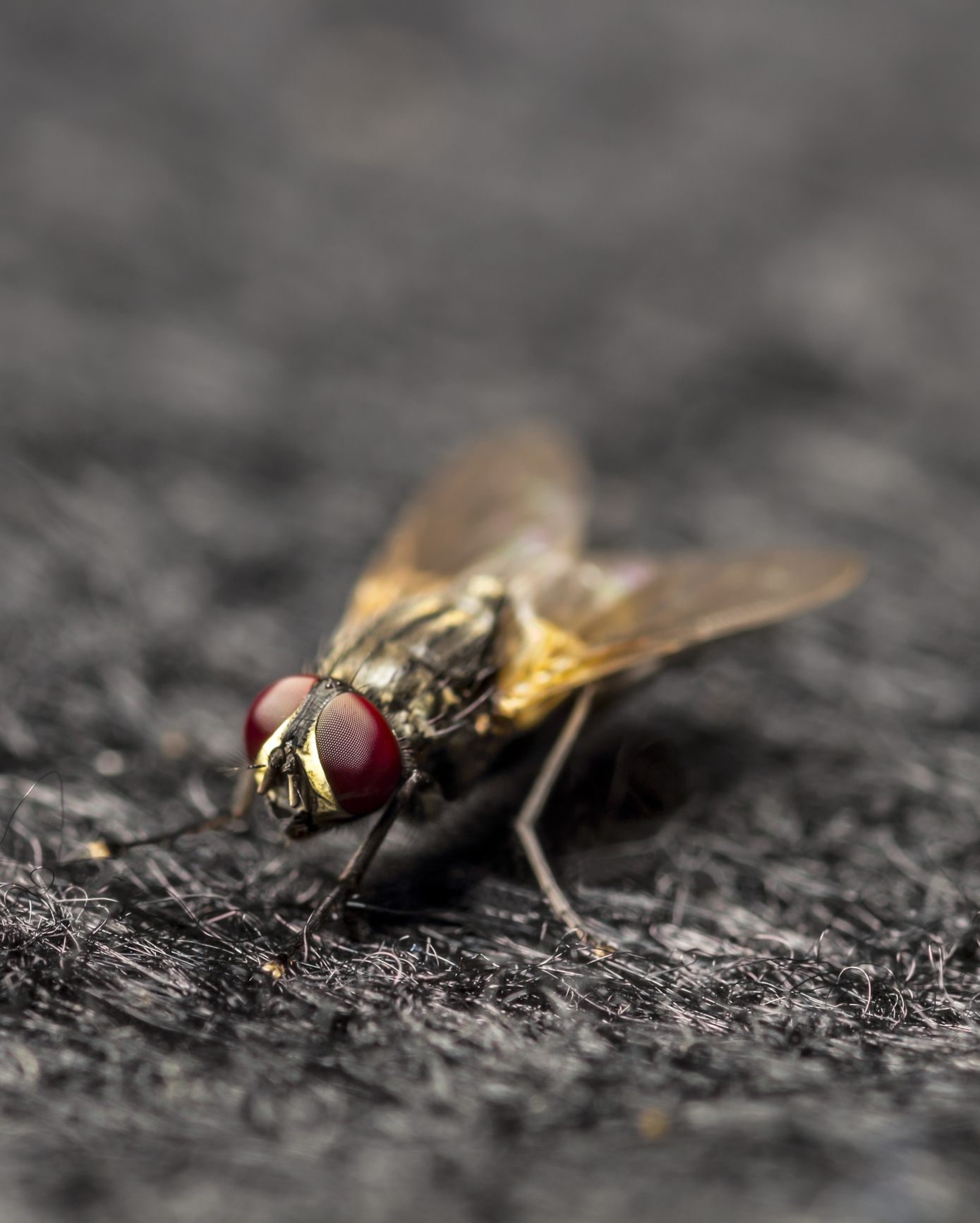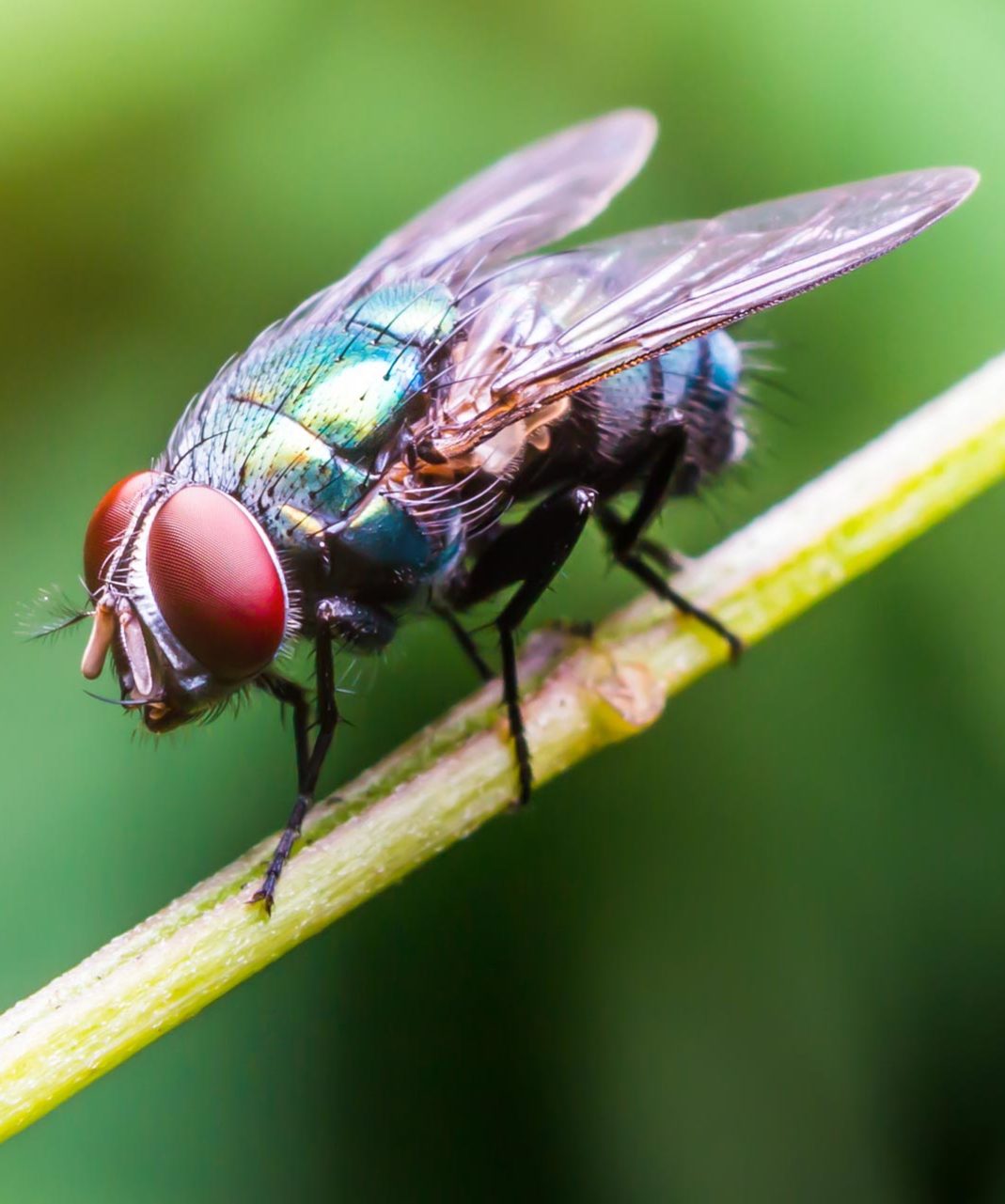FLIES

Flies here, flies there, flies everywhere?
What flies am I likely to have in my home?
There are several types of flies that may make a nuisance of themselves at your home or business in Reading, Newbury, Basingstoke or the surrounding areas of Berkshire. These are the Cluster Fly, the Housefly and the Fruit Fly. Flies are disease vectors and spread a multitude of unwelcome diseases with ease so eradicating them is essential and the team here at Abbey Pest Control are fully licensed and insured to help you tackle any infestation that you may have.
What is a Cluster Fly?
Cluster flies are dark greyish and around 8mm in size with yellowish hairs on their back and with overlapping wings. In the Autumn months, cluster flies with gather in large numbers in upper rooms or the roof spaces of houses to hibernate. They will then leave these areas in Spring to seek out a suitable place to lay their eggs. When cluster flies gather in mass, they can give off a characteristic smell. They are sluggish in flight and are a nuisance in the house. The larvae of one particular species of cluster flies feeds primarily on certain earthworms, this species is more common in rural areas such as Newbury, Chieveley, Eversley and the outskirts of the suburban areas of Berkshire.
What is a Housefly?
There are 2 types of housefly, the lesser and the common housefly. The adult fly is around 7-8mm long and grey with four dark stripes running along the thorax and a single pair of wings with a veined membrane running through them. These flies have very large eyes that are brilliant at detecting motion, this can make them particularly difficult to catch as they react to even the smallest movements. Their mouth parts are designed to feed on liquids and they cannot bite.
Houseflies are able to walk along ceilings and across windows, this is due to the housefly having sticky pads on each of their 6 feet. Houseflies can spread bacteria and diseases as they can access a multitude of surfaces and feed on faecal matter and decaying foods. The flies will excrete and regurgitate wherever they come to land; this helps to spread diseases such as tuberculosis, gastroenteritis, salmonellosis, dysentery, typhoid fever and cholera amongst others.
House flies will lay their eggs in decaying matter, a single fly will typically lay 100 to 150 eggs which will usually hatch within 48 depending on the conditions. Their larvae are known as maggots and are typically found in rotting food and household waste, particulary during the warmer months in and around Reading where the conditions for the eggs to hatch can speed the process up to around 8 hours from the time the fly laid her eggs.

What is a Fruit Fly?
Fruit flies are a small fly at around 3-4mm in length, they usually have red or dark eyes and a lighter thorax, appearing brown in colour. A single fruit fly can lay up to 500 eggs and the lifecycle from egg to adult fly can take less than a week in the right conditions.
The adult fly will lay eggs on rotting or fermenting fruit and vegetables but have also been known to lay eggs in drains, empty bottles, bins and bottles. They simply require a moist area of decaying matter to find an adequate space to lay their eggs. They are able to spread diseases as they land on various surfaces, spreading the bacteria from the rotting food sources they’ve come into contact with. It is important to identify any rotting or decomposing food sources and remove them to prevent further infestations, Abbey Pest Control conduct full surveys before starting any treatment as we always aim to provide an effective and long-term solution to the infestation.
Are there any other Flies that may infest my home?
You may also come across green bottle flies and blue bottle flies in your home, these flies will lay their eggs and thrive around dead or decaying animals or plant life. Blue bottle flies will feed on decaying meat or carcasses, they will also lay their eggs within the animal and their larvae will feed on the carcass once they have hatched. Green bottle flies will do the same but with dead or decaying plant life.
If you are noticing blue bottles in or around your home in Reading or Berkshire, this could be an indication of another pest infestation. Poisoned rodents such as rats, mice and squirrels will seek a quiet spot to die, if a pest controller has used poison on a nearby rodent population then they may have found an area in or around your home to seek harbourage and this could be attracting blue bottles to your home.
If you have a problem with flies don’t hesitate to contact us here at Abbey Pest Control Reading.
Covering: Reading, Tilehurst, Purley on Thames, Caversham, Wokingham, Shinfield, Arborfield, Three Mile Cross, Woodley, Earley, Newbury, Chieveley, Thatcham, Basingstoke, Hook, Camberley and surrounding areas. Our price includes a full survey, written report, all labour and materials. All of our operatives are fully trained, experienced members of the NPTA and we have comprehensive public liability insurance.

Call now: 07525 850347

Email: abbeypestreading@gmail.com

Areas covered: Reading, Tilehurst, Purley on Thames, Caversham, Wokingham, Shinfield, Arborfield, Three Mile Cross, Woodley, Earley, Newbury, Chieveley, Thatcham, Basingstoke, Hook, Camberley and surrounding areas.







